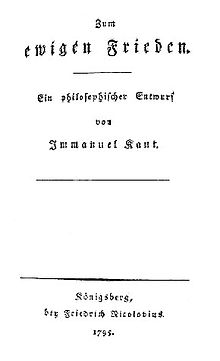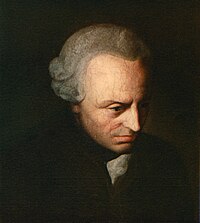Classical liberalism is a political tradition and a branch of liberalism that advocates free market and laissez-faire economics and civil liberties under the rule of law, with special emphasis on individual autonomy, limited government, economic freedom, political freedom and freedom of speech. Classical liberalism, contrary to liberal branches like social liberalism, looks more negatively on social policies, taxation and the state involvement in the lives of individuals, and it advocates deregulation.

Immanuel Kant was a German philosopher and one of the central Enlightenment thinkers. Born in Königsberg, Kant's comprehensive and systematic works in epistemology, metaphysics, ethics, and aesthetics have made him one of the most influential and controversial figures in modern Western philosophy, being called the "father of modern ethics", the "father of modern aesthetics", and for bringing together rationalism and empiricism earned the title of "father of modern philosophy".
World government is the concept of a single political authority with jurisdiction over all of Earth and humanity. It is conceived in a variety of forms, from tyrannical to democratic, which reflects its wide array of proponents and detractors.

Ludwig Quidde was a German politician and pacifist who is mainly remembered today for his acerbic criticism of German Emperor Wilhelm II. Quidde's long career spanned four different eras of German history: Otto von Bismarck, the Hohenzollern Empire under Wilhelm II (1888–1918), the Weimar Republic (1918–1933); and Nazi Germany. In 1927, Quidde was awarded the Nobel Peace Prize.
In ethics, political philosophy, social contract theory, religion, and international law, the term state of nature describes the hypothetical way of life that existed before humans organised themselves into societies or civilizations. Philosophers of the state of nature theory propose that there was a historical period before societies existed, and seek answers to the questions: "What was life like before civil society?", "How did government emerge from such a primitive start?", and "What are the hypothetical reasons for entering a state of society by establishing a nation-state?".

Proponents of democratic peace theory argue that both electoral and republican forms of democracy are hesitant to engage in armed conflict with other identified democracies. Different advocates of this theory suggest that several factors are responsible for motivating peace between democratic states. Individual theorists maintain "monadic" forms of this theory ; "dyadic" forms of this theory ; and "systemic" forms of this theory.
Cosmopolitanism is the idea that all human beings are members of a single community. Its adherents are known as cosmopolitan or cosmopolite. Cosmopolitanism is both prescriptive and aspirational, believing humans can and should be "world citizens" in a "universal community". The idea encompasses different dimensions and avenues of community, such as promoting universal moral standards, establishing global political structures, or developing a platform for mutual cultural expression and tolerance.
Collective security is a multi-lateral security arrangement between states in which each state in the institution accepts that an attack on one state is the concern of all and merits a collective response to threats by all. Collective security was a key principle underpinning the League of Nations and the United Nations. Collective security is more ambitious than systems of alliance security or collective defense in that it seeks to encompass the totality of states within a region or indeed globally.

Fiat iustitia, et pereat mundus is a Latin phrase, meaning "Let justice be done, though the world perish".
Cosmopolitan democracy is a political theory which explores the application of norms and values of democracy at the transnational and global sphere. It argues that global governance of the people, by the people, for the people is possible and needed. Writers advocating cosmopolitan democracy include Immanuel Kant, David Held, Daniele Archibugi, Richard Falk, and Mary Kaldor. In the cosmopolitan democracy model, decisions are made by those affected, avoiding a single hierarchical form of authority. According to the nature of the issues at stake, democratic practice should be reinvented to take into account the will of stakeholders. This can be done either through direct participation or through elected representatives. The model advocated by cosmopolitan democrats is confederal and decentralized—global governance without world government—unlike those models of global governance supported by classic World Federalism thinkers, such as Albert Einstein.
League of peace is an expression coined by Immanuel Kant in his work "Perpetual Peace: A Philosophical Sketch". The league of peace should be distinguished from a peace treaty because a peace treaty prevents or terminates only one war, while the league of peace seeks to end all wars forever. This league does not hold any power of the state, but only exists for "the maintenance and security of the freedom of the state and of other states in league with it, without there being any need for them to submit to civil laws and their compulsion, as men in a state of nature must submit."

The political philosophy of Immanuel Kant (1724–1804) favoured a classical republican approach. In Perpetual Peace: A Philosophical Sketch (1795), Kant listed several conditions that he thought necessary for ending wars and creating a lasting peace. They included a world of constitutional republics by establishment of political community. His classical republican theory was extended in Doctrine of Right (1797), the first part of Metaphysics of Morals. At the end of the 20th century Kant's political philosophy had been enjoying a remarkable renaissance in English-speaking countries with more major studies in a few years than had appeared in the preceding many decades.
"Idea for a Universal History with a Cosmopolitan Purpose" or "The Idea of a Universal History on a Cosmopolitical Plan" is a 1784 essay by Prussian philosopher Immanuel Kant (1724–1804), a lecturer in anthropology and geography at Königsberg University.
The capitalist peace, or capitalist peace theory, or commercial peace, posits that market openness contributes to more peaceful behavior among states, and that developed market-oriented economies are less likely to engage in conflict with one another. Along with the democratic peace theory and institutionalist arguments for peace, the commercial peace forms part of the Kantian tripod for peace. Prominent mechanisms for the commercial peace revolve around how capitalism, trade interdependence, and capital interdependence raise the costs of warfare, incentivize groups to lobby against war, make it harder for leaders to go to war, and reduce the economic benefits of conquest.
The rule according to a higher law is a statement which expresses that no law may be enforced by the government unless it conforms with certain universal principles of fairness, morality, and justice. Thus, the rule according to a higher law may serve as a practical legal criterion to qualify the instances of political or economical decision-making, when a government, even though acting in conformity with clearly defined and properly enacted law, still produces results which many observers find unfair or unjust.
International economic structures range from complete autarky to complete market openness. This structure has undergone numerous changes since the beginning of the nineteenth century. The state-power theory as put into perspective by Stephen Krasner (1976), explains that the structure of international trade is determined by the interests and power of states acting to maximize their aggregate national income, social stability, political power and economic growth. Such state interests can be achieved under free trade.
Liberalism is a school of thought within international relations theory which revolves around three interrelated principles:

An anti-war movement is a social movement, usually in opposition to a particular nation's decision to start or carry on an armed conflict. The term anti-war can also refer to pacifism, which is the opposition to all use of military force during conflicts, or to anti-war books, paintings, and other works of art. Some activists distinguish between anti-war movements and peace movements. Anti-war activists work through protest and other grassroots means to attempt to pressure a government to put an end to a particular war or conflict or to prevent it in advance.







